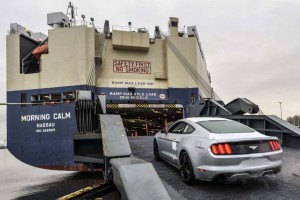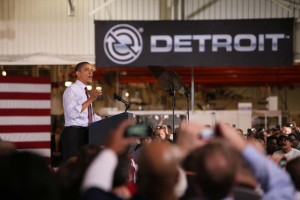
The new Trans Pacific Partnership is supposed to level the trade playing field in Asia, but Ford disagrees.
Auto-related provisions promise to be among the most contentious elements of the proposed Trans Pacific Partnership as it moves towards final Congressional approval, following negotiations with a dozen different Pacific Rim countries produced a tentative agreement on a new trade deal.
The United States, Japan, Canada, Mexico and eight other nations, among them Vietnam, Australia, New Zealand, Chile and Ecuador, unveiled the deal Monday after eight years of talks. A final deal came after almost a week of talks in Atlanta resolved final disputes over dairy, pharmaceutical drugs and automobile export rules, according to the New York Times.
The pact was designed to place the signatories, including the United States, in a stronger position in the economic competition with China. However, a number of nations with ties to the global auto industry such as the Thailand and the Philippines are not parties to the agreement.
Ford Motor Co. has already attacked the final draft of the agreement reached this week, complaining that it doesn’t go far enough in attacking currency manipulation by Japan, home of the company’s rivals Toyota, Nissan and Honda.
“U.S. lawmakers took unprecedented action to set a clear negotiating objective for addressing currency manipulation in all future trade deals,” Ziad Ojakli, group vice president for government and community relations for Ford, said in a statement released before the deal was announced.

President Obama believes the proposed Trans Pacific Partnership will make it easier to trade with Asia.
“The TPP fails to meet that test. To ensure the future competitiveness of American manufacturing, we recommend Congress not approve TPP in its current form, and ask the administration to renegotiate TPP and incorporate strong and enforceable currency rules. This step is critical to achieving free trade in the 21st century,” Ojakli said.
American carmakers have complained their Japanese manufacturers used an exchange rate that is kept artificially low by the Bank of Japan as a competitive advantage in markets around the world. Japanese carmakers, led by Toyota, have just as vigorously denied the charge.
Michigan’s Congressional delegation, which is heavily influenced by both the auto industry and by the United Auto Workers, also is lining up against the proposed trade agreement. Gary Peters, Michigan’s freshman Democratic Senator, also said the TPP doesn’t go far enough in addressing currency manipulation.
(Diesel scandal an “existence-threatening” crisis, VW chairman concedes. For more, Click Here.)
“TPP is a sweeping agreement that touches nearly every aspect of your daily life. It impacts the food you eat, the air you breathe, the medicines you take, and the cars you drive. It will impact demand for the world-class farming equipment tens of thousands of UAW members build,” UAW President Dennis Williams said in a statement.
“If factories close revenue shortfalls and budget cuts will ensue and UAW members whose jobs serve the public would suffer. The more than 100,000 UAW members who work for auto suppliers might be faced with a flood of subsidized imports. In fact, auto suppliers produce hundreds of billions of goods and support more than three and a half million U.S. jobs directly and indirectly.”
The Trans Pacific Partnership is designed to phase out thousands of import tariffs as well as other barriers to international trade, like Japanese regulations that keep out some American-made autos and trucks. It also would establish uniform rules on corporations’ intellectual property, and open the Internet even in communist Vietnam.
The Office of the United States Trade Representative said the tentative agreement will lead to the elimination of some 18,000 tariffs that the participating countries have placed on American exports, including autos, machinery, information technology and consumer goods, chemicals and agricultural products as varied as avocados in California and wheat, pork and beef from the Plains states.
Some tariffs, including the so-called “Chicken Tax” the 25% tariff that has limited the import of light-duty trucks into to the U.S., are phased out gradually. Over the years, General Motors, Ford and the former Chrysler Group have tightened their grip on the U.S. market for pickup trucks, which will be very difficult for any Asian or European manufacturers, but they also apparently gained a long phase out period that could extend for three decades, according to documents released by Canada.
(Click Here for details about the new Range Rover Evoque convertible.)
A separate agreement between the United States and European Union that would clear the way for harmonizing key safety and air pollution regulations is also in the works.
President Barack Obama sees the TPP as a cornerstone of his administration’s economic legacy, and a way to boost exports of U.S.-made products. His administration also seeks a deal with Japan as crucial, since the world’s third-largest economy is a critical ally in a region where China is expanding its influence.
“This partnership levels the playing field for our farmers, ranchers, and manufacturers by eliminating more than 18,000 taxes that various countries put on our products,” Obama said in a statement. “It’s an agreement that puts American workers first and will help middle-class families get ahead.”
However, under the so-called fast-track rules passed by Congress this past summer, the administration must give Congress 90 days notice of a final agreement before a vote is held. The U.S. International Trade Commission must also complete an economic analysis of the deal before Congress votes. A vote by Congress is not expected until next spring at the earliest during the height of 2016 political season.
(To see more about NHTSA calling for more cash to battle cyber hackers, Click Here.)
The trade agreement is also likely to draw fire from some Republican Presidential candidates, particularly Donald Trump, who is recent weeks has excoriated Ford for announcing an expansion of its manufacturing base in Mexico.

The secrecy surrounding this trade agreement smells like a cesspool. Without complete public disclosure no agreement should be approved.
ANOTHER BAD DEALFOR AMERICAN MANUFACTURING. WHY DO WE ALLOW THESE TERRIBLE DEALS TO GO THRU.WHO ARE THESE POLITICIANS WORKING FOR ANYWAY